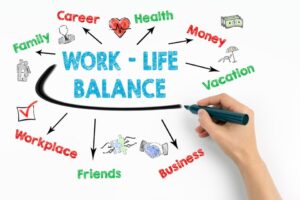In today’s fast-paced world, finding a healthy work-life balance has become more important than ever. With constant demands from both personal and professional life, many people find themselves overwhelmed, exhausted, and on the brink of burnout. Striking the right balance is not just about having more free time—it’s about managing your energy, setting priorities, and making time for what truly matters. When achieved, a healthy work-life balance not only reduces stress but also significantly boosts productivity and overall satisfaction.
The Problem of Burnout
Burnout has become a common issue in modern workplaces. Characterized by chronic fatigue, emotional exhaustion, and a lack of motivation, burnout can have serious consequences for both employees and employers. It can lead to decreased job performance, strained relationships, and mental health challenges such as anxiety and depression. The root of burnout often lies in an imbalanced life—when work consistently takes precedence over rest, relationships, and self-care.
How Work-Life Balance Reduces Burnout
A healthy work-life balance is the antidote to burnout. It allows individuals to recharge their energy, maintain mental clarity, and approach work with renewed focus and creativity. It creates space for personal growth, strengthens relationships, and leads to a more fulfilling life overall. When people feel balanced and in control of their time, they are more likely to be engaged, motivated, and productive.
Setting Boundaries to Maintain Balance
One of the most effective strategies to reduce burnout is learning to set clear boundaries between work and personal time. In an age of digital communication and remote work, the lines between the two can easily become blurred. It’s important to establish defined work hours and resist the urge to check emails or take calls outside of those times. Creating a dedicated workspace at home can also help mentally separate work from leisure.
Managing Time Effectively
Time management is another crucial element of work-life balance. Instead of trying to do everything at once, prioritizing tasks and focusing on what truly matters can lead to more efficient workdays. Breaking down larger projects into smaller tasks, using scheduling tools, and setting realistic goals help avoid feeling overwhelmed. Taking short breaks throughout the day to stretch, breathe, or step outside can also enhance focus and productivity.
Learning to Say No
Equally important is the ability to say no. Many people take on too much, fearing they’ll disappoint others or miss out on opportunities. However, overcommitting leads to stress and underperformance. Understanding one’s limits and being selective about which tasks to take on can help maintain energy and prevent burnout. It’s better to do a few things well than to stretch oneself too thin.
Prioritizing Self-Care
Self-care is often seen as a luxury, but in reality, it’s a necessity. Prioritizing physical and mental health through regular exercise, a balanced diet, adequate sleep, and mindfulness practices can dramatically improve one’s ability to handle stress. Engaging in hobbies, spending time with loved ones, or simply relaxing with a book or music helps restore balance and bring joy into daily life.
Disconnecting from Technology
Disconnecting from technology is also essential. While smartphones and laptops keep us connected, they can also prevent us from fully unwinding. Setting aside tech-free times each day—such as during meals or before bed—can create a much-needed mental break from the constant stream of information. This not only improves sleep but also strengthens personal connections and promotes emotional well-being.
The Role of Support Systems
Support systems play a vital role in maintaining balance. Whether it’s talking to a friend, seeking advice from a mentor, or working with a therapist, having someone to lean on can ease stress and provide valuable perspective. Open communication with employers or colleagues about workload, expectations, and the need for flexibility can also foster a healthier work environment.
The Importance of Taking Breaks and Vacations
Taking regular vacations, even short ones, is another powerful way to reduce burnout. Time away from work allows the brain to reset, offering a fresh outlook and renewed energy. It’s important to truly disconnect during this time—avoiding emails and work calls—so that the mind can rest and recharge. Even staycations or day trips can be effective if they provide a change of scenery and an opportunity to relax.
The Role of Employers in Promoting Balance
Employers have a significant role to play in promoting work-life balance. Organizations that encourage flexible work arrangements, promote wellness programs, and prioritize employee well-being often see better performance, higher morale, and reduced turnover. Creating a culture that values balance rather than glorifying overwork sets a positive tone and benefits everyone involved.
Conclusion: Achieving Balance for Better Productivity and Well-Being
When individuals and organizations both commit to work-life balance, the results are transformative. People feel more in control of their lives, relationships flourish, and productivity soars. The key is not perfection, but intentionality—taking daily steps to ensure that work and life support each other rather than compete.
Ultimately, a healthy work-life balance is not just a personal goal but a vital component of long-term success and happiness. By making time for rest, connection, and self-care, individuals can protect themselves from burnout and unlock their full potential. With the right mindset and strategies, it’s possible to create a lifestyle where both career and personal well-being thrive side by side.




